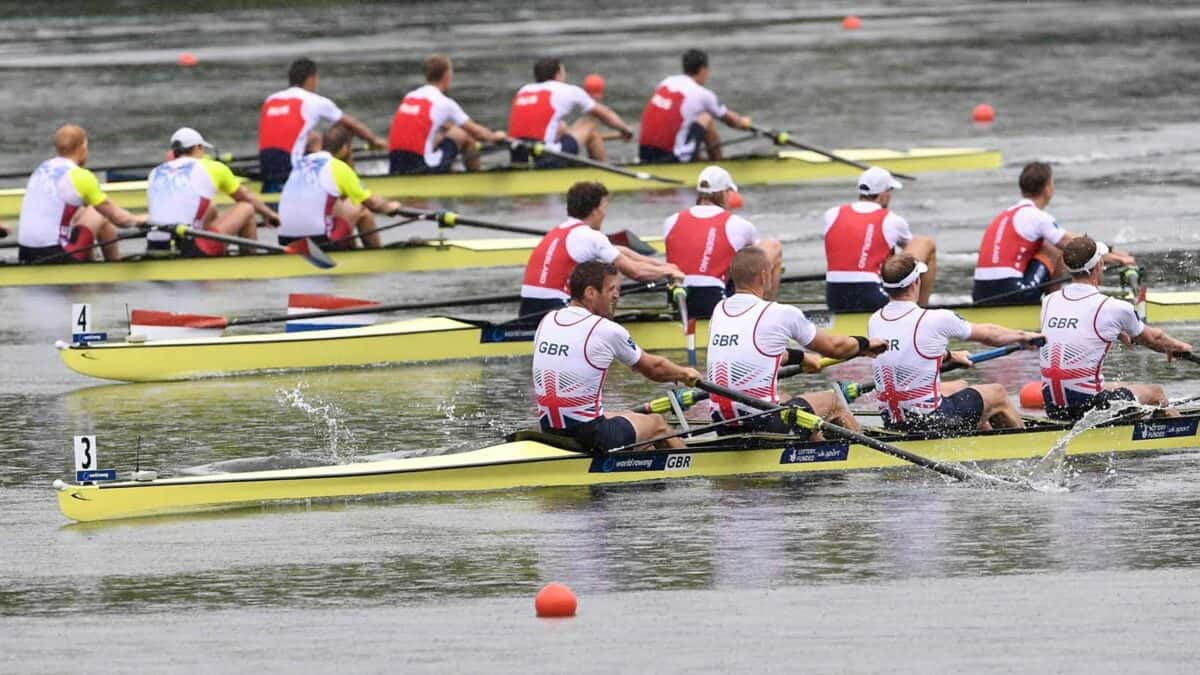
13 Jul 2016
Olympic countdown – the men’s four
Great Britain and the United States largely surpass other nations in terms of their total historic Olympic medal count in this boat class. They have been the most regular and consistent Olympic medallists in the past century. Great Britain won 13 Olympic medals in the four, the first in 1908 and latest in 2012, while the United States won 12 medals so far since 1904.
But the British have won the most Olympic titles in this boat class, having topped the podium a total of eight times to date. The men’s four has included some of Britain’s most successful rowing athletes ever, such as Steve Redgrave, Matthew Pinsent, James Cracknell and more recently Andrew T Hodge and Peter Reed. Understandably the four has repeatedly become Britain’s flagship boat and its stars have become national household names.
Great Britain is the reigning Olympic Champion and owns the World Best Time, which stands at 5:37.86. During the past Olympic cycle, they claimed one World Championship title, in 2014, and earned bronze at last year’s worlds. As for the United States, after taking Olympic bronze in London, they won world bronze in 2013 and then silver in 2014.
However, the most consistent World Championship medallists in this Olympic cycle have actually been Australia. They took silver at London 2012 and did not miss a single World Championship podium leading up to Rio, with two silvers and one bronze.
Besides these top three nations, only two other nations have broken into the World Championship medals this past quadrennial and they both did so on one occasion only – the Netherlands won World Championship gold in 2013 and Italy in 2015.
The 2016 World Rowing Cup season has confirmed that these five nations (Great Britain, the United States, Australia, Italy and the Netherlands) will be the top ones to keep on looking out for in Rio. Each of them claimed at least one World Cup medal, Great Britain leading with two golds.
All-time dream crew in the men’s four
By Martin Cross
Using more than a century of modern rowing, Martin Cross looks at the sport’s legendary performers and plays selector. This is his pick.
Stroke: Nico Rienks (NED)
At stroke, the Dutchman who won Olympic golds in both sculling and rowing, is Nico Rienks. His double sculling gold, together with Ronald Florijn in 1988, was Holland’s first team gold for over 60 years. Rienks showed his adaptability by winning World Championship gold with a different partner – Henk-Jan Zwolle. But it was his inspired leadership from the stroke seat of the incredible Dutch eight, that won the 1996 Olympic gold, that confirmed his seat in this boat.
3-seat: Mahe Drysdale (NZL)
Though there was ‘no room’ for Mahe Drysdale in the all-time sculling squad, the current world’s fastest sculler does anchor this four from the ‘3’ seat. The 2012 Olympic Champion is no stranger to the four, having rowed in the 2-seat in the Kiwi crew that finished fifth at the Athens Olympics. He has also been one of the powerhouses in the ‘Great Eights’ made up of scullers that have won head races in both Great Britain and America.
2-seat: Matthew Pinsent (GBR)
Behind Drysdale would come the awesome power and unshakable determination to win of Matthew Pinsent. The four-time Olympic Champion picked up two of his four golds in the stroke seat of the British four. Both in the Sydney and Athens Games, Pinsent delivered race-winning performances under extreme pressure.
Bow: Steve Redgrave (GBR)
Steve Redgrave would slot ‘nicely’ into the bow seat – though in truth, the five-time Olympic Champion would be able to row in any seat – or on either side. Both his legendary racing nous and his ability to make the key race calls, would make Redgrave the perfect man to ‘run’ the fur from the bow seat.
Stats & links
Videos
World Rowing Championships – Aiguebelette 2015
World Rowing Championships – Amsterdam 2014
World Rowing Championships – Chungju 2013
World Best Times – Historical Evolution (M4-)
|
Time |
Boat |
Competition |
|
5:37.86 |
GBR |
2012 World Rowing Cup II – Rotsee/Lucerne, Switzerland (Heat 1) |
|
5:41.35 |
GER |
2002 World Rowing Championships – Guadalquivir/Seville, Spain (Final A) |
|
5:48.06 |
GBR |
1998 World Rowing Championships – Fuehlingersee/Cologne, Germany (Final A) |
|
5:48.16 |
GBR |
1997 World Rowing Cup II – Vaires sur Marne/Paris, France (Final A) |
|
5:48.44 |
ITA |
1994 World Rowing Championships – Eagle Creek/Indianapolis, United States (Final A) |
Olympic Best Times – Historical Evolution (M4-)
|
Time |
Boat |
Competition |
|
05:47.1 |
AUS |
2012 Olympic Games – Dorney Lake Eton/London, Great Britain (Heat 1) |
|
05:48.5 |
GER |
2004 Olympic Games – Schinias/Athens, Greece (Final B) |
|
05:50.4 |
GBR |
2004 Olympic Games – Schinias/Athens, Greece (Semifinal) |
|
05:54.6 |
CRO |
1996 Olympic Games – Atlanta, United States (Final B) |
|
05:55.0 |
AUS |
1992 Olympic Games – Estany Banyoles/Barcelona, Spain (Final A) |
Olympic Qualification
|
No. |
Olympic Qualification Regatta |
M4- (13) |
|
1 |
WCH 1 |
ITA |
|
2 |
WCH 2 |
AUS |
|
3 |
WCH 3 |
GBR |
|
4 |
WCH 4 |
CAN |
|
5 |
WCH 5 |
GER |
|
6 |
WCH 6 |
NED |
|
7 |
WCH 7 |
USA |
|
8 |
WCH 8 |
BLR |
|
9 |
WCH 9 |
GRE |
|
10 |
WCH 10 |
RUS |
|
11 |
WCH 11 |
ROU |
|
12 |
Final OQR 1 |
RSA |
|
13 |
Final OQR 2 |
FRA |

